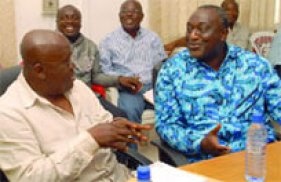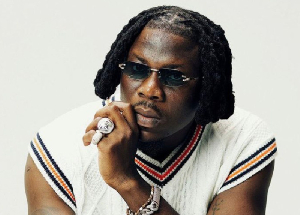A political organization is a grouping of individuals from different walks of life and, as required in the constitutional provision, it is supposed to encompass people regardless of tribe, ethnicity, educational background, religion, creed, skin colour etc.
The New Patriotic Party (NPP) has demonstrated over the years that it only recognizes people from a certain ethnic grouping as seen in the leanings of those seeking to hold its flag at the 2012 Presidential Election at tomorrow’s presidential congress
On the tickets are five Akans namely; Nana Addo Danquah Akuffo Addo; an Akyem, Alan Kwadwo Kyerematen; an Ashanti, Ambassador Isaac Osei; an Ashanti, Prof. Frimpong Boateng; an Ashanti and Rev. Kwame Koduah; an Ashanti.
Copiously missing on the NPP ballot paper is a person from any of the minority tribes in the party as they are convinced the Akan Majority won’t vote for them, so some have accepted to be mere spectators irrespective of their merit whilst other have also gone to bed early hoping they would to be the first to congratulate the would-be winner and catch his eye for the future.
What is looking like a convention in the NPP where only Akans lead the party at the presidential elections can be traced to the genesis of this political party its participation, before, during and after Ghana’s independence from Britain.
The party started as the United Gold Coast Convention (UGCC), to the United Party (UP) to the Popular Party Front (PFP) and now the New Patriotic Party (NPP). The United Gold Coast Convention, the premier political party in Ghana was led by the so-called “Doyen of Ghanaian politics,” Dr. J.B. Danquah, an Akyem.
The party later changed its name, colors and personalities because of the exigencies of the time to the United Party led by Dr. Abrefa Busia, who was the Prime Minister of the second republic, between 1969-1972. He was unfortunately overthrown in a military uprising led by Colonel Ignatius Kutu Acheampong.
After the June 4 uprising that ousted the Acheampong regime, the country was again returned to civilian rule with an election organized in 1979. Victor Owusu from the Ashanti Region burst onto the scene, leading the party after it had again changed its name to PFP. When the fiercely contested election was over, Dr. Hilla Limann was declared winner. The PFP’s defeat has since been attributed to William Ofori-Atta (Paa Willie) another Akyem, and his United National Convention (UNC), an offshoot of the Danquah-Busia tradition which also contested that election.
Multi-party democracy was restored in 1992, after Ghanaians voted in a referendum for the return of civilian rule which ushered the country into its fourth republican status. The Danquah-Busia tradition quickly emerged with a new name and contested the elections as the New Patriotic Party (NPP).
The late Prof. Albert Adu Boahen contested ex-President Rawlings and lost miserably, with the party declaring the famous “Stolen Verdict” only for John Agyekum Kufuor to also put up a bad showing in 1996 against the same ex-President Rawlings. Mr. Kufuor later in 2000 defeated current president John Evans Atta Mills, after Mr. Rawlings’ exit.
What is significant throughout the various stages of the NPP is the apparent representation of a particular tribe thus making people tag the party, an Akan party. Some have even gone to an extent of saying when one counts any five members of the NPP, four of them are Akans.
With the overwhelming dominance of Akan in the NPP, it would be difficult for any person for instance from the tribes considered to be in the minority namely; Ga, Ewe, a Dangbe, a Dagomba to have a bite of the flagberership of the party. Some have even claimed the party was built around the Golden Stool of Ashanti and Akyem Abuakwa State, and that unless you are from one of the sides, forget leading it.
Ex-vice President Alhaji Aliu Mahama, a Dagomba from Northern Ghana who had described himself as an apprentice under ex-President Kufuor, was miserably embarrassed at the 2007 NPP Congress which got Nana Akufo-Addo to bear the NPP flag. Even Mr. Kufuor did not vote for his vice for eight years as he terribly wanted Alan Kyeremanteng, an Akan to succeed him.
Even prominent persons like Papa Owusu Ankomah and Dr. Kobina Arthur Kennedy who are distinguished persons, and have the faculty of transforming the fortunes of the country, could not fly at the 2007 NPP Congress held on the University of Ghana Campus in Legon, Their only crime is their birth right, they are Akan-Fante.
The NPP is beginning to shape up like the situation in People’s Democratic Party (PDP) of Nigeria, where only people from the North can lead the party and subsequently rule that country.
Mostly when a president is exiting, his likely successor is his vice. Examples abound all over, from Clinton to Al-Gore, from Frederick Chiluba to the late Levy Mwanawasa of Zambia, from Nelson Mandela to Thabo Mbeki of South Africa and our own case of former president Rawlings to the current president John Evans Atta Mills.
From Dr, J.B Danquah to Dr. Kofi Abrefa Busia, to Victor Owusu, to Prof. Albert Adu Boahen to John Kufuor, it has always being an Akan parade. One can even hasten to add that even the Akyem front is divided with some extolling their own intellectual prowess, over the others.
Indeed, it is beginning to appear merit does not count in the Danquah-Busia political tradition when it comes to the selection of its flagbearer. To any elementary student of politics, the NPP would rather be defeated at the polls with an unpopular and unmeritorious Akan candidate than picking a meritorious person from the minority tribes who would guarantee its own victory, and the betterment of Ghana.
Unless the unexpected happens the minority tribes in the NPP will continue to be hewers of wood and drawers of water and will never have a chair among their masters, because a time-honoured political tradition must not be derailed.
General News of Friday, 6 August 2010
Source: Herald
Minority Tribes Missing As NPP Parade Akans Only

















